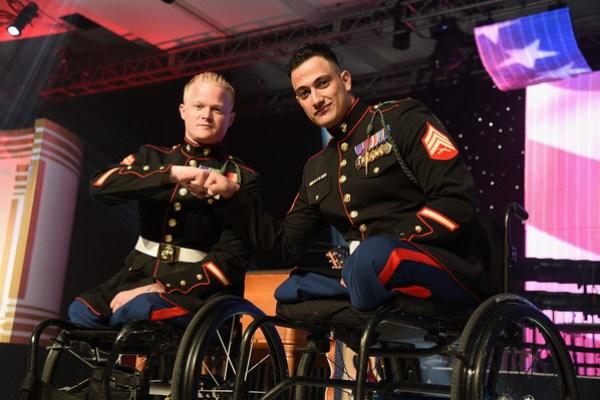The fist bump was their thing in Afghanistan, where both Marines lost legs in the same attack, and the fist bump is still their thing in the hunt for child predators under a special law enforcement program to train and hire medically retired veterans.
Cpl. Justin Gaertner and Sgt. Gabriel Martinez in their dress blues bumped fists at an event earlier this year in Florida, just as they bumped fists while recovering from their wounds.
Gaertner, 26, of Tampa, Fla., has been partnered for the last two years with retired Army Special Forces Staff Sgt. Nathan Cruz, 42, executing the computer forensics to track down sex traffickers in the ICE/HERO program.
Working out of the Tampa, Fla., Immigration and Customs Enforcement (ICE) office, Gaertner and Cruz use their newly-acquired computer skills to determine probable cause and go on raids to seize evidence hidden in computer hard drives, software programs and cell phones, much of it involving disturbing images of young children.
Martinez has just committed to training for the same job that falls under the Department of Homeland Security's mandate in a program that began two years ago.
He was expected to start the year-long training in the fall for the program that was initially limited to U.S. Special Operations Command veterans but now is open to medically retired vets from all the services, said Tamara Spicer, an ICE spokeswoman.
Martinez and Gaertner were both wounded while on a route clearance mission outside Marjah in Afghanistan's southwestern Helmand province on Nov. 26, 2010.
An improvised explosive device went off and "my best friend blew up right in front of me," Gaertner said. He was wounded when he stepped on a mine while trying to clear a medevac landing zone.
Stunned at the Scope
In phone interviews last week, Gaertner, who served five years in the Marines, and Cruz, a 15-year Army veteran, said they were both channeling the discipline and determination they brought from the military into going after child predators and pornographers. Despite their training, both admitted they were stunned at the scope of the problem.
"I don't think we ever realized fully what we were getting into or the nature of the suspects we were going after," Gaertner said. "We don't really understand them. There's no character to the people who do these crimes.
"We've seen schoolteachers to daycare workers to sports photographers to diplomats - there's really no face to these crimes," Gaertner said. "It's been hard and it's been a long road but luckily Nathan and I are in the same office and we have each other to fall back on."
Cruz also said "I didn't know what I was going to get into" at the start. "I wasn't working, I wasn't doing anything," but "I heard from some SOCOM buddies about this so I thought I'd give it a shot."
Now, as the father of three children, "I think there's nothing better I should be doing," Cruz said. "Kids are being victimized over and over. They need someone to get their back. We just want to put the guys that are hurting them behind bars."
Cruz and Gaertner were part of the first HERO Corps (Human Exploitation Rescue Operations Corps) in 2013 working with Homeland Security Investigations (HSI) to meet the growing backlog of sex trafficking cases.
2,300 Child Predators
Last year, ICE seized more than 5.2 million gigabytes of data related to child exploitation and pornography and arrested more than 2,300 child predators on criminal charges.
"The HERO program, and the resulting hiring of Nathan and Justin, has paid great dividends for HSI Tampa across the board," said Susan L. McCormick, special agent in charge of HSI Tampa. "We gained skilled employees with valuable experience and training."
In October 2013, the first class of 17 HEROs graduated from the initial training as computer forensic analysts and in October 2014 a second class of 13 HEROs graduated. In August, ICE was expected to begin training another 50 candidates for the HERO Corps.
In May, Congress passed a bill to make the ICE/HERO program a permanent part of Homeland Security and its budget. The bill was quickly signed into law by President Obama as the Justice for Victims of Trafficking Act of 2015.
The program had been partly funded by a five-year, $10 million contribution from individuals and foundations through the non-profit National Association to Protect Children.
At a Washington ceremony last month, Homeland Secretary Jeh Johnson and ICE Director Sarah Saldana swore 22 new vets into the HERO Corps designed "to allow wounded, ill or injured warriors the chance to continue serving their country on a new battlefield - the fight against child predators."
"These heroes have all served their country with honor and distinction and, despite the traumas of war they all have endured, they have answered the call yet again," Johnson said.
"The main thing we're focusing on is child exploitation," Cruz said. "I'd say maybe 80 percent of our cases are child pornography." The average suspect might have about 1,000 images but "we've seen cases with more than 40,000 images. They trade them with their buddies so they can get more - that's how it works. The more I find, the more years you're going to get."
Rescuing Children
Once they have zeroed in on an offender, the hardest, and most rewarding, part of the job begins - finding and rescuing those children in the images, Cruz said.
"We try to save that kid, try to see where he or she is from. That brings more satisfaction, knowing those kids are not going to be harmed anymore."
Gaertner said that a recent case in which a suspect had 28,000 images led to the rescue of 130 children nationwide.
Cruz and Gaertner also said that part of the job was focusing on themselves and the potential effects of constantly dealing with the worst of society and the images of exploited children. "Luckily, Nathan and I are in the same office and we have each other to fall back on," Gaertner said.
"We cannot bring work home, we were taught that during our military careers," Cruz said. "I tell everybody that when I went to SERE school (Survival Evasion Resistance Escape), the one thing they stress the most is 'stay in the circle.' I stay in the circle. Work stays at work, when I go home it's Nathan the dad."
While partnering with Gaertner, "we talk about it all the time," Cruz said of the potential psychological effects. "He knows what I do, I know what he does. Me and Justin, we're lucky that we're here together."
-- Richard Sisk can be reached at Richard.Sisk@military.com

























